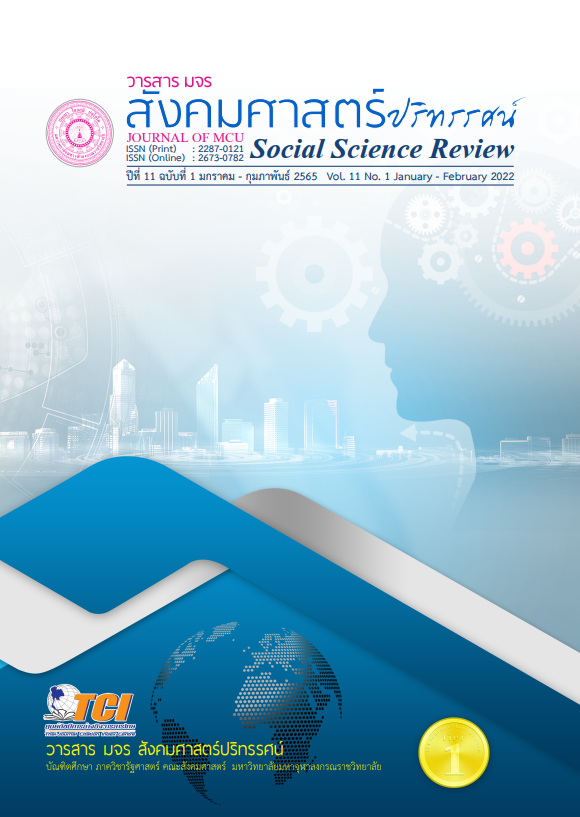การพัฒนาการบริหารจัดการเสนาสนะของวัด ตามมาตรฐานสุขาภิบาลจังหวัดชัยภูมิ
คำสำคัญ:
การพัฒนาการบริหารจัดการ, เสนาสนะของวัด, มาตรฐานสุขาภิบาล, จังหวัดชัยภูมิบทคัดย่อ
บทความวิจัยนี้มีวัตถุประสงค์เพื่อวิเคราะห์สภาพทั่วไป กระบวนการ และ นำเสนอการพัฒนา เป็นการวิจัยแบบผสานวิธี ระหว่างการวิจัยเชิงคุณภาพโดยสัมภาษณ์เชิงลึกกับผู้ให้ข้อมูลสำคัญ 18 รูปหรือคน จากแบบสัมภาษณ์ และการสนทนากลุ่มเฉพาะกับผู้ทรงคุณวุฒิ 10 รูปหรือคน วิเคราะห์ข้อมูลโดยการพรรณนาความ และการวิจัยเชิงปริมาณดำเนินการโดยศึกษากลุ่มตัวอย่างจำนวน 192 รูป เครื่องมือที่ใช้ในการเก็บรวมรวมข้อมูลคือแบบสอบถามซึ่งมีค่าความเชื่อมั่นที่ระดับ 0.994 สถิติที่ใช้ในการวิเคราะห์ข้อมูลได้แก่ ค่าความถี่ ค่าร้อยละ หาค่าเฉลี่ย ส่วนเบี่ยงเบนมาตรฐาน
ผลการวิจัยพบว่า 1. สภาพทั่วไปในการบริหารจัดการเสนาสนะของวัด พบว่าเจ้าอาวาสร่วมกับกรรมการวัด ไวยาวัจกรวัดและผู้นำชุมชน ตัดสินใจในการบริหารจัดการวัดกันเอง เน้นเรื่องสัปปายะเป็นหลัก ไม่เน้นเรื่องมาตรฐานสุขาภิบาลด้านที่อยู่อาศัยเท่าที่ควร 2. กระบวนการบริหารจัดการเสนาสนะของวัด ตามมาตรฐานสุขาภิบาลจังหวัดชัยภูมิตามหลัก PDCA พบว่า โดยภาพรวม อยู่ในระดับมาก ( = 4.21, S.D. = 0.657) 3) การพัฒนาการบริหารจัดการ ได้แก่ สร้างที่อยู่อาศัยให้มีความมั่นคงแข็งแรง มีอากาศถ่ายเทได้สะดวก จัดสร้างให้เป็นสัดส่วน คำนึงถึงความสะอาดความสงบเรียบร้อย มีการแบ่งเขตที่อยู่อาศัยให้ชัดเจน เช่นมีเขตพุทธาวาส ธรรมมาวาส สังฆาวาส เป็นต้น มีความเป็นระเบียบเรียบร้อยสวยงาม มีความสะอาด มีความสะดวกสบายต่อการใช้เสนาสนะนั้น
เอกสารอ้างอิง
กฤษณพงศ์ ฟองสินสุ์. (2556). ปัจจัยที่มีผลต่อความล่าช้าในโครงการก่อสร้างขององค์กรปกครองส่วนท้องถิ่นในเขตอำเภอเมืองอุตรดิตถ์ (รายงานการวิจัย). อุตรดิตถ์: มหาวิทยาลัยราชภัฏอุตรดิตถ์.
จามร ช้างมงคล. (2564). ความพึงพอใจของประชาชนต่อการจัดการงานสาธารณูปการของวัดเวฬุวนาราม อำเภอดำเนินสะดวก จังหวัดราชบุรี. วารสารพุทธนวัตกรรมและการจัดการ, 4(1), 10-19.
พระครูปลัดปรีชา จิรนาโค (บัวผัด). (2558). รูปแบบการจัดการสาธารณูปการของวัดในเขตการปกครองคณะสงฆ์ภาค 14 (ดุษฎีนิพนธ์พุทธศาสตร์ดุษฎีบัณฑิต สาขาวิชาการจัดการเชิงพุทธ). พระนครศรีอยุธยา: มหาวิทยาลัยมหาจุฬาลงกรณราชวิทยาลัย.
พระธรรมโกศาจารย์ (ประยูร ธมฺมจิตฺโต). (2549). พุทธวิธีบริหาร. กรุงเทพฯ: โรงพิมพ์มหาจุฬาลงกรณราชวิทยาลัย.
พระธีรภัทร์ นาถสีโล. (2564). การบริหารจัดการวัดของพระสังฆาธิการเพื่อส่งเสริมความศรัทธา ของประชาชน อำเภอคลองหลวง จังหวัดปทุมธานี. วารสารพุทธนวัตกรรมและการจัดการ, 4(2), 18-29.
พระมารุต กิตฺติปาโล. (2564). บทบาทพระสงฆ์ในการพัฒนาชุมชนอำเภอชะอำ จังหวัดเพชรบุรี. วารสารพุทธนวัตกรรมและการจัดการ, 4(1), 18-27.
พระอนพัทย์ ฐิตธมฺโม. (2564). การส่งเสริมความสมานฉันท์ตามแนวพระพุทธศาสนาสำหรับชุมชน ของวัดพระนารายณ์มหาราชวรวิหาร จังหวัดนครราชสีมา. วารสารสหวิทยาการนวัตกรรมปริทรรศน์, 4(1), 22-31.
พระเอกลักษณ์ อชิตโตและคณะ. (2564). เครือข่ายพระสงฆ์สาธารณะสงเคราะห์ของหลวงพ่อแดง นนฺทิโย: กับการช่วยเหลือประชาชนในพื้นที่น้ำท่วมจังหวัดชัยภูมิ นครราชสีมา พระนครศรีอยุธยา. วารสารพุทธนวัตกรรมและการจัดการ, 4(2), 57-68.
สำนักงานเจ้าคณะจังหวัดชัยภูมิ. (2563). แบบสำรวจภารกิจและแบบตรวจการคณะสงฆ์. ชัยภูมิ: สำนักงานเจ้าคณะจังหวัดชัยภูมิ.
ดาวน์โหลด
เผยแพร่แล้ว
รูปแบบการอ้างอิง
ฉบับ
ประเภทบทความ
สัญญาอนุญาต
ลิขสิทธิ์ (c) 2022 วารสาร มจร สังคมศาสตร์ปริทรรศน์

อนุญาตภายใต้เงื่อนไข Creative Commons Attribution-NonCommercial-NoDerivatives 4.0 International License.
เพื่อให้เป็นไปตามกฎหมายลิขสิทธิ์ ผู้นิพนธ์ทุกท่านต้องลงลายมือชื่อในแบบฟอร์มใบมอบลิขสิทธิ์บทความให้แก่วารสารฯ พร้อมกับบทความต้นฉบับที่ได้แก้ไขครั้งสุดท้าย นอกจากนี้ ผู้นิพนธ์ทุกท่านต้องยืนยันว่าบทความต้นฉบับที่ส่งมาตีพิมพ์นั้น ได้ส่งมาตีพิมพ์เฉพาะในวารสาร มจร สังคมศาสตร์ปริทรรศน์ เพียงแห่งเดียวเท่านั้น หากมีการใช้ภาพหรือตารางหรือเนื้อหาอื่นๆ ของผู้นิพนธ์อื่นที่ปรากฏในสิ่งตีพิมพ์อื่นมาแล้ว ผู้นิพนธ์ต้องขออนุญาตเจ้าของลิขสิทธิ์ก่อน พร้อมทั้งแสดงหนังสือที่ได้รับการยินยอมต่อบรรณาธิการ ก่อนที่บทความจะได้รับการตีพิมพ์ หากไม่เป็นไปตามข้อกำหนดเบื้องต้น ทางวารสารจะถอดบทความของท่านออกโดยไม่มีข้อยกเว้นใดๆ ทั้งสิ้น





